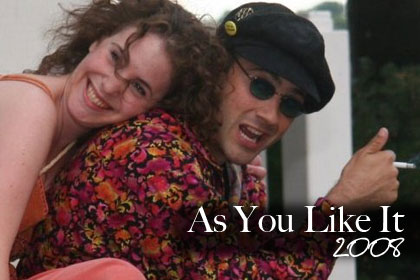None of this is original

Kris Joseph (along with Sarah Kitz) in a picture from a production of As You Like It
produced by the St Lawrence Shakespeare Festival. We stole the picture from his website.
On his website, actor and blogger Kris Joseph has conducted an interesting thought exercise about how Shakespeare would fare if he were working in our copyrighted and trademarked world. This is a timely exercise for us here in Vancouver as our city is about to be cordoned into corporatized zones devoted to brand purity. Fortunately, we will be allowed “free speech zones” where we can jump up and down and protest. I think the latter innovation came from Beijing. Yep, we’re taking lessons on freedom of speech from the Chinese government.
In any event, I have a personal interest in this topic for a couple of reasons. One is that my first play after a ten-year hiatus was inspired by the same source story Shakespeare drew on for the Merchant of Venice. Portia, My Love was as different from the Italian original as it was from Shakespeare, yet many who identified themselves as steeped in Shakespeare condemned it as nothing more than a blatant rip-off. I was a little discouraged that these individuals were so unfamiliar with the actual text of Merchant (rather than specific plot points in the play) that they didn’t realize how substantially different the two plays were. I was also rather astonished that they lacked the basic knowledge that Shakespeare invented very little by way of story (with, I believe the Merry Wives of Windsor being his only “original” story – and even then it’s all a bit questionable).
About the time that I wrote Portia I was considering doing a PhD. Perhaps inspired by my experience, I became very interested in the history of copyright and how its increased enforcement during the 20thcentury began to shape (and in my opinion damage) creative expression. This was about the time Life of Pi and Last Orders were being condemned for “ripping off” earlier source material. I found these criticisms astounding. Martel and Swift had spent years writing fucking novels pulled from their imaginations and people were upset about where they got “the idea from”. Why were they being raked over the coals while Shakespeare passes into the pantheon of greatness unquestioned?
Actors (consciously or unconsciously) observe those around them and draw inspiration in the creation/definition of the characters they play. Painters use shades of colours that others have used, paint landscapes that others have painted. Are they “unoriginal”? It is a profound lack of understanding of how the creative process works to believe that we can define exactly what elements in any created work are original. I would argue no element ever truly is. They are sourced from art and from the life around us. It is how those elements, those inspirations, are used that should be the measure of creativity and “originality”.
Many artists instinctively cling to copyright as a fundamental good but I think they are often misguided. It might be sobering to learn that copyright was not created (nor ever truly intended) to protect artists. Rather it was developed to protect publishers. It’s never been about us.
The discussion on Joseph’s site is worth reading to learn about potential differences between Canadian and US definitions of copyright. At the moment, Canada seems far more open (to my way of thinking). No doubt we will, in lapdog fashion, follow the US but let’s hope not.
By the way, just to add another layer. PLANK works under something called Creative Commons.



